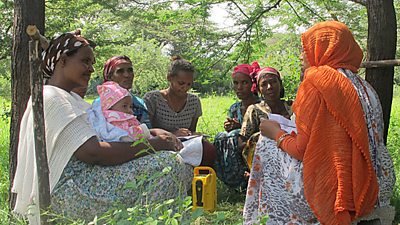Downloads
Listening groups, based on ����ý Media Action’s health programmes, are adding value to the Ethiopian government’s Health Development Army, a network of volunteers tasked with learning about key health behaviours and leading others in their communities. Volunteers report gaining new and valuable knowledge on maternal and child health practices and growing in confidence to better support others in the community through one-to-five networks.
Publication date: August 2016
The project
Since 2013 ����ý Media Action has produced two radio magazine programmes in Ethiopia – (Dawn of Life) and (Maternal Light) – targeting women of reproductive age (aged15-45) and their husbands. Both aim to improve the health of mothers and babies.
In addition to being aired on three regional broadcasters: Oromia Radio and Television Organisation (ORTO), Ethiopia Broadcasting Corporation (EBC) and Amhara Radio Network, a number of two year-long listening groups have been run to extend the reach and impact of the programmes to the community through the Health Development Army (HDA) and the one-to-five network.
The HDA comprises of male and female volunteers who learn about healthy behaviours (such as: vaccinating children, sleeping under mosquito bed nets and using family planning) and promote these in their communities by acting as role models and giving advice.
Part of the national Health Extension Programme, they are embedded within a one-to-five network in which one individual learns new information and then passes this on to five others in their community. They operate across almost all kebeles (neighbourhoods) in Ethiopia, while ����ý Media Action’s listening groups work within only a small fraction of these. As of August 2016, 162 listening groups were operating across 96 kebeles.
Research approach
A qualitative study was conducted in February and March 2016 to understand the added value of listening to ����ý Media Action’s programmes in a group setting. Using a case study approach that engaged multiple stakeholders, the study consisted of 13 focus group discussions (FGDs) and 38 in-depth interviews (IDIs) in six different communities. FGDs were carried out with listening group members (both currently active groups and ‘graduates’ whose groups had completed the two-year course). IDIs were conducted with individual group members, the health extension workers (HEWs) who facilitate the groups, and households visited by group members as part of the one-to-five network.
Key findings
Situating the listening groups within the one-to-five network is the key to success:
- Listening groups are filling knowledge gaps in the one-to-five network. Members told us that being part of the group helped them correct basic misconceptions around reproductive, maternal, newborn and child health (RMNCH). Despite being expected to lead others in the community, many reported having limited knowledge on healthy RMNCH practices, prior to being involved in a listening group.
- HEWs running listening groups recognise that these groups help extend the reach of vital health information within the community, creating further demand for services.
Discussion and repetition is beneficial:
- Listening groups add value by providing a space in which group members can discuss and seek clarification on themes from the broadcast. Discussion time helps members consolidate learning through repetition.
- Members come to form strong bonds through sharing together in a group. In several cases members have gone on to create a community co-operative or ‘ekub’ to help support pregnant women in their community.
Direct benefits to members:
- Listening groups provide access to uniform learning on reproductive and maternal health (in many cases, this is the first time members have access to such information).
- Members, particularly women, said they have grown in confidence and feel more empowered to support others in the community across RMNCH issues and contribute in other community meetings.
- Both HEWs and members report changes in gender dynamics within households. Some men report having learned to support their wives better during pregnancy, and HEWs have observed some women beginning to address their husbands more directly.
Community impact:
- Information learned from the listening groups is being disseminated to the community via the one-to-five model, and HEWs are largely satisfied that information passed is accurate and of high quality.
- Households visited by group members say that information is delivered in a more detailed and attentive manner compared with other information available to them.
- Many group members spoke of people in their wider networks who they were able to support into practising healthier behaviours, such as contraception or birth spacing, antenatal care attendance, delivery in a facility, and caring for a newborn.
Implications
����ý Media Action’s research into the Biiftuu Jireenyaa and Jember listening groups shows that they are highly compatible with the Ethiopian government’s ambitions for the HDA. Groups are successful in helping one-to-five members gain new knowledge and grow in confidence to lead their communities.
This research suggests that if used at scale, ����ý Media Action listening groups embedded within the HDA could prove to be a valuable asset to the government’s Health Extension Programme nationwide.
